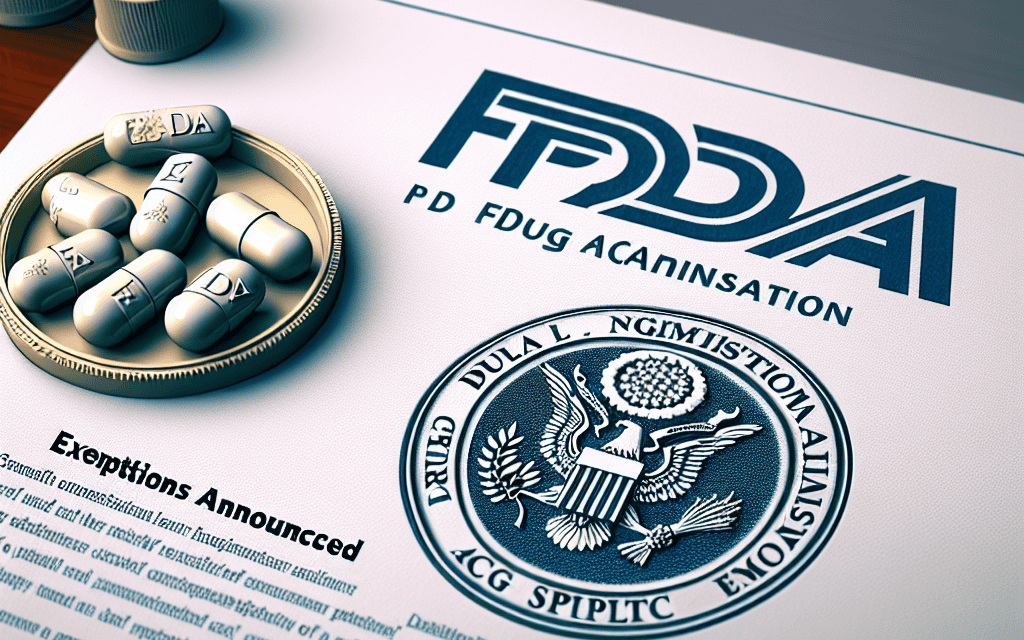FDA Announces Exemptions to Drug Supply Chain Security Act
The Drug Supply Chain Security Act (DSCSA) was enacted to enhance the security of the pharmaceutical supply chain in the United States. It aims to protect consumers from counterfeit, stolen, contaminated, or otherwise harmful drugs. Recently, the U.S. Food and Drug Administration (FDA) announced certain exemptions to this act, which have significant implications for various stakeholders in the pharmaceutical industry. This article delves into the details of these exemptions, exploring their rationale, impact, and the broader context of drug supply chain security.
Understanding the Drug Supply Chain Security Act
The Drug Supply Chain Security Act, part of the Drug Quality and Security Act signed into law in 2013, establishes requirements to develop and enhance the security of the pharmaceutical distribution supply chain. The DSCSA outlines critical steps to build an electronic, interoperable system to identify and trace certain prescription drugs as they are distributed in the United States. This system is intended to improve the detection and removal of potentially dangerous drugs from the supply chain to protect U.S. consumers.
Key Provisions of the DSCSA
The DSCSA mandates several key provisions that stakeholders in the pharmaceutical supply chain must adhere to:
- Product Tracing: Manufacturers, repackagers, wholesale distributors, and dispensers must provide information about a drug and who handled it each time it is sold in the U.S. market.
- Product Verification: The act requires verification of the legitimacy of the drug product identifier down to the package level.
- Detection and Response: The DSCSA outlines procedures for detecting and responding to suspect and illegitimate products.
- Notification: It requires notification to the FDA and other stakeholders about illegitimate products.
- Wholesaler and Third-Party Logistics Provider Licensing: The act sets national standards for licensing of wholesale distributors and third-party logistics providers.
These provisions are designed to create a safer and more secure drug supply chain, reducing the risk of counterfeit drugs entering the market.
The Importance of DSCSA Compliance
Compliance with the DSCSA is crucial for ensuring the safety and integrity of the pharmaceutical supply chain. Non-compliance can lead to significant risks, including:
- Public Health Risks: Non-compliance can result in counterfeit or substandard drugs reaching consumers, posing serious health risks.
- Legal and Financial Consequences: Companies that fail to comply with DSCSA requirements may face legal penalties, fines, and damage to their reputation.
- Supply Chain Disruptions: Non-compliance can lead to disruptions in the supply chain, affecting the availability of essential medications.
Given these risks, the pharmaceutical industry has invested heavily in systems and processes to ensure compliance with the DSCSA.
Rationale Behind the FDA’s Exemptions
The FDA’s decision to announce exemptions to the DSCSA is driven by several factors. Understanding these reasons is crucial for stakeholders to adapt to the changes effectively.
Addressing Supply Chain Challenges
The pharmaceutical supply chain is complex and involves multiple stakeholders, including manufacturers, distributors, and pharmacies. The FDA recognizes that certain requirements of the DSCSA may pose challenges for some stakeholders, particularly smaller entities. By providing exemptions, the FDA aims to alleviate these challenges and ensure that the supply chain remains efficient and effective.
For example, small pharmacies may struggle with the technological and financial burden of implementing electronic tracing systems. Exemptions can help these entities continue to operate without compromising the overall security of the supply chain.
Facilitating Access to Essential Medications
Another key rationale for the exemptions is to facilitate access to essential medications. In some cases, strict compliance with DSCSA requirements could lead to delays or disruptions in the supply of critical drugs. By granting exemptions, the FDA aims to ensure that patients have timely access to the medications they need.
This is particularly important in situations where there is a shortage of a specific drug or when a rapid response is required, such as during a public health emergency.
Encouraging Innovation and Flexibility
The FDA recognizes that the pharmaceutical industry is constantly evolving, with new technologies and business models emerging. By providing exemptions, the FDA encourages innovation and flexibility within the industry. This approach allows stakeholders to explore new ways of enhancing supply chain security without being constrained by rigid regulatory requirements.
For instance, exemptions may enable companies to pilot new technologies for drug tracing and verification, ultimately leading to more effective and efficient solutions.
Impact of Exemptions on Stakeholders
The FDA’s exemptions to the DSCSA have significant implications for various stakeholders in the pharmaceutical supply chain. Understanding these impacts is crucial for stakeholders to navigate the changes effectively.
Manufacturers and Repackagers
For manufacturers and repackagers, the exemptions may provide some relief from the stringent requirements of the DSCSA. This can lead to cost savings and operational efficiencies, particularly for smaller companies that may struggle with the financial and logistical burden of compliance.
However, manufacturers and repackagers must still ensure that their products are safe and secure. The exemptions do not absolve them of their responsibility to maintain the integrity of the supply chain. Companies must continue to invest in systems and processes that enhance supply chain security, even if they are exempt from certain requirements.
Wholesale Distributors and Third-Party Logistics Providers
Wholesale distributors and third-party logistics providers play a critical role in the pharmaceutical supply chain. The exemptions may provide these stakeholders with greater flexibility in how they manage and distribute drugs. This can lead to more efficient operations and reduced costs.
However, distributors and logistics providers must remain vigilant in their efforts to detect and respond to suspect and illegitimate products. The exemptions do not eliminate the need for robust systems and processes to ensure the security of the supply chain.
Pharmacies and Dispensers
For pharmacies and dispensers, the exemptions may alleviate some of the technological and financial burdens associated with DSCSA compliance. This is particularly important for small, independent pharmacies that may lack the resources to implement electronic tracing systems.
However, pharmacies and dispensers must continue to prioritize patient safety. They must remain diligent in verifying the legitimacy of the drugs they dispense and reporting any suspect or illegitimate products to the FDA.
Case Studies and Examples
To better understand the impact of the FDA’s exemptions to the DSCSA, it is helpful to examine real-world case studies and examples. These case studies illustrate how different stakeholders have navigated the changes and highlight best practices for ensuring supply chain security.
<h





